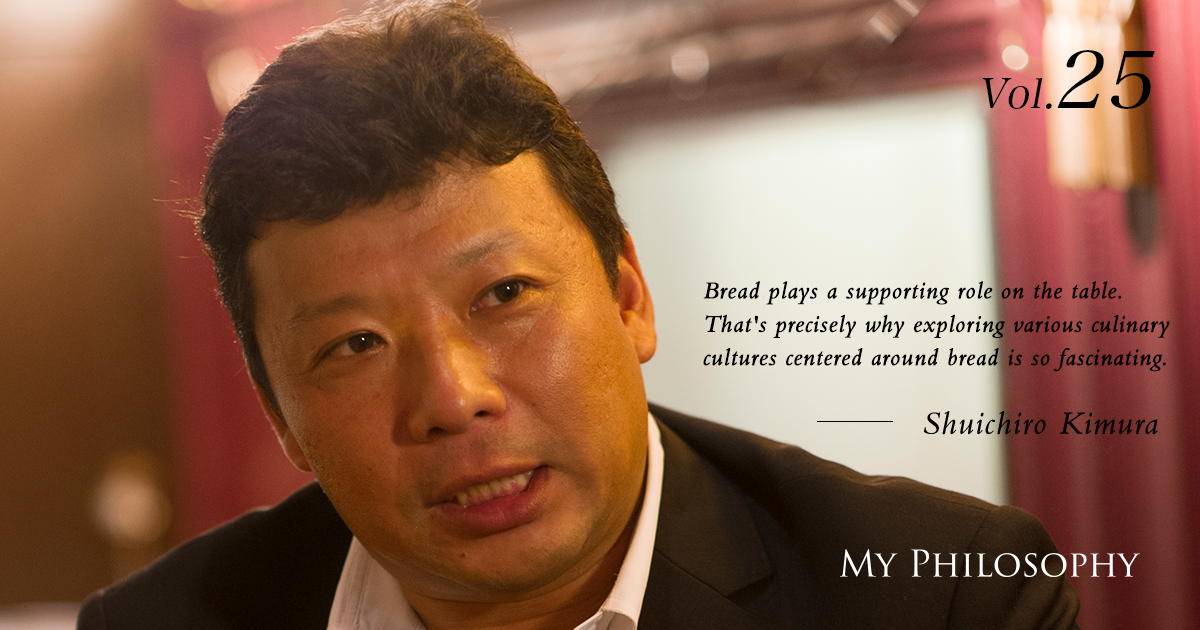
Born as the eldest son of the sixth-generation president of Ginza Kimuraya Sohonten, Mr. Shuichiro Kimura chose the challenging path of entrepreneurship without any support from Kimuraya in order to spread authentic French bread in Japan. He has grown "Maison Kayser" to currently operate 22 directly-managed stores domestically and 4 overseas. We heard from him about his passionate commitment to bread.
Profile
Vol.25 Shuichiro Kimura
Representative Director of Boulangerie Eric Kayser Japon Inc.
After graduating from Keio Law School, the Faculty of Law, he joined The Chiyoda Mutual Life Insurance Company (at that time) and was in charge of corporate sales. At the age of 27, he left his job to train in bread-making and studied fermentation and baking at the American Institute of Baking. After working in a bakery in New York, he moved to France to train under Mr. Eric Kayser. In September 2000, he established a company as Mr. Kayser's partner and opened "Maison Kayser," offering traditional French bread. Not just manufacturing and selling bread, he is dedicated to the development of the entire bread industry with the concept of "a happy dining table with bread, a wonderful life with bread."
※The titles and other details are as of the time of the interview (September 2013).
The History of French Bread
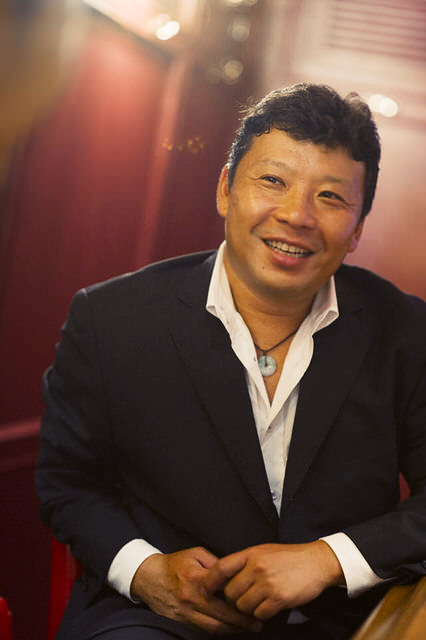
Bread was formally introduced to Japan post-World War II. Before and during the war, bread was primarily a naval food. On battleships, rice was cooked in hearths, but this could cause fires from sparks during combat. Hence, bread emerged as a filling alternative, leading to the creation of hardtack. After the war, the General Headquarters (GHQ) actively promoted bread consumption, which facilitated its spread in Japan, including French bread.
Throughout its 5,000-year history, bread has undergone two major transformations. Originally, bread dough made from wheat and water was kneaded by foot, a process that was quite unsanitary, especially since the French wore shoes from morning until night. A significant change came with the introduction of mixers for kneading dough, addressing hygiene concerns. Another pivotal moment was the discovery by Pasteur that fermentation is a physiological action of yeast. Initially, bakers used yeast as a supplement and developed their unique fermentation methods. However, during World War II, as farmers were conscripted as soldiers, there was a chronic shortage of wheat. Bakers began collecting flour from the floor and re-kneading it, leading to bread that was darkened by dust. To make the most of the limited wheat, a technique was developed to “inflate” the dough by adding large amounts of yeast. Even after the war ended and wheat production resumed, the use of yeast in bread-making spread throughout France due to its efficiency and profitability, and this technique has become mainstream in Japan as well. Eric Kayser, however, challenged this trend, gaining high praise for returning to the use of natural yeast, which enhances both the flavor and quality of bread.
Training in France that Changed My Future Path
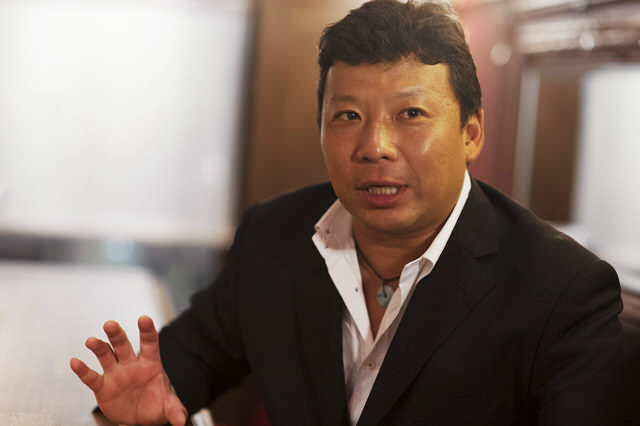
Originally planning to take over the family business, I decided to join a life insurance company after graduating from university for social experience. Six years later, the bread industry was stagnant; many shops were just catering to the market by making sweet breads, and there were no new types of bakeries emerging. Convenience stores were the main competition, and no matter how hard one worked, profits were minimal. It was a dreamless industry where hardworking people were not rewarded and was on the decline. That’s when the idea came up among the leaders of the “Japan Bread & Cake Newspaper Co. Ltd.” to try professional education in bread-making. I was naturally the choice due to my background as the eldest son of a well-known bakery family in Japan.
I started by learning the craftsman’s mindset in Japan, then went to the American Institute of Baking in the U.S. to study theory, worked as a baker in New York, and then returned to Japan. Later, I went to France to train under Mr. Eric Kayser as part of a training tour. In France, I was bullied simply because I couldn’t speak French. The only way to get back at them was to outdo them. In a world where age doesn’t matter, I worked extremely hard while my senior took two days off a week, and I took only one, eventually surpassing him. I climbed the ladder step by step. I first met Mr. Kayser when he came to Japan to conduct a professional baking class, and I had to return to Japan due to visa issues. I assisted him, arranged hotels according to his needs, and provided meticulous service, which led us to discuss various ideas about bread and shops, and we built a trust relationship.
In Japan, the bread sold in shops is essentially the same, only the packaging and interiors differ. Like fashion trends, if it’s the year of the melon bread, then every shop sells melon bread. Why pay royalties if you’re doing the same thing? That’s why I wanted to compete with authentic French bread. It was said that a specialty French bread shop would not work in Japan because Japanese people have weak chewing power, so Japanese people prefer softer breads. As the eldest son of Kimuraya, failure was not an option. My experience in sales at the life insurance company proved invaluable. While bakeries traditionally wait for customers, I adopted a proactive approach to selling. Mr. Kayser once told me, “In the 27 years I’ve been doing this, you are the best at selling bread,” which was a pleasant surprise.
A New Store that Embodies the Maison Kayser Concept

A bakery that only sells bread will eventually reach its limits in business expansion. To foster the development of the bread industry, it’s essential to delve deeper into how to incorporate bread into customers’ lifestyles. How can we sell the idea of a wonderful life with bread to our customers? After a conceptual period of ten years, we brought this idea to life with the opening of “Grill & Bar” at the Takanawa Main Store on September 20, 2013. This establishment offers crispy chicken sandwiches and delicious hamburgers for lunch, along with homemade tarts and ice cream in the afternoon. In the evening, customers can enjoy all-you-can-eat bread while drinking alcohol and snacking on items grilled right in front of them. To popularize French bread in Japanese households, we need to widely convey how the presence of French bread can enrich the dining table and make life more enjoyable. This restaurant serves as a demonstration space for that purpose.
Bread plays a supporting role on the table. When it tries to take the spotlight, it becomes awkward. However, creating a restaurant focused solely on soup or stew wouldn’t be sophisticated. By imbuing the establishment with a philosophy of food and a culture of the dining table, various lifestyles revolving around bread can be created, leading to the revitalization of the entire bread industry.
Envisioning the Sevelopment of Food Culture Centered on Bread
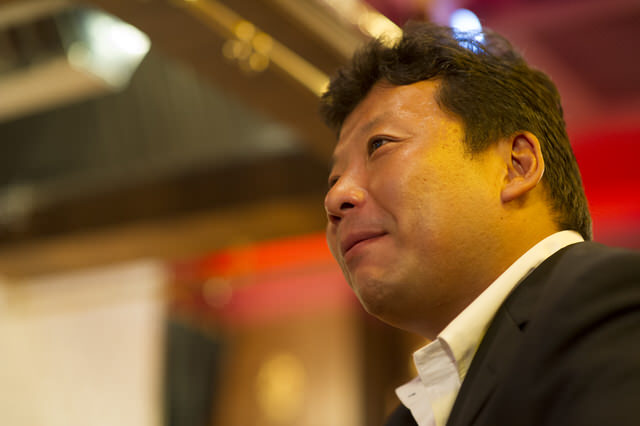
I cannot accomplish my work alone. In our case, it involves service staff, bread artisans, ingredient producers, and transportation providers. The work is made possible by the collaboration of individuals from every aspect of the bread-making process, alongside the customers who support us. While there are hierarchical relationships between superiors and subordinates, as well as between customers and producers, my focus lies in ensuring the happiness of everyone involved. This entails continuously seeking out new and interesting ideas to prevent stagnation and creating an environment where all stakeholders can find fulfillment.
One of our current endeavors is the development of “Low-Carb Bread.” It presents a challenging yet rewarding task to create bread that is both delicious and low in carbohydrates, suitable for individuals with diabetes who can only consume a limited amount of carbohydrates per day. Additionally, our bread is now featured in JAL’s in-flight meals, which has received positive feedback and contributed to increased passenger satisfaction. By expanding into various fields such as bakeries, patisseries, cafes, restaurants, and even airline catering, bread can serve as a focal point for collaboration and innovation.
Japan has matured as an economic society. During times of economic immaturity, people sought brands for credibility. While France may seem mature, Paris, in particular, still retains elements of immaturity, making it challenging to establish sophisticated dining styles, such as enjoying charcuterie with wine. Tokyo, on the other hand, provides a fertile ground for such ideas to flourish. Selling bread alone will not foster evolution within the industry. I find the excitement in the prospect of successfully integrating bread into Tokyo’s unique food culture.
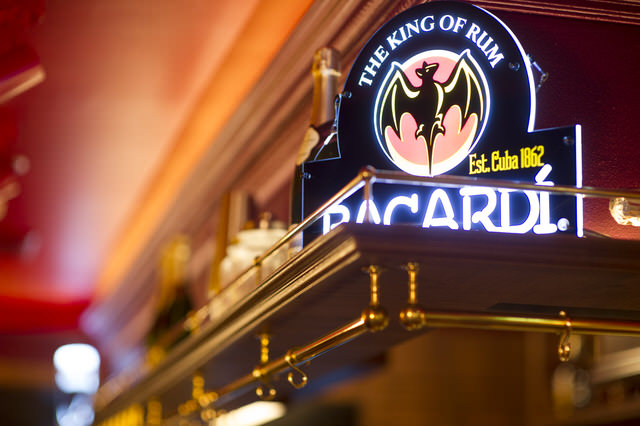
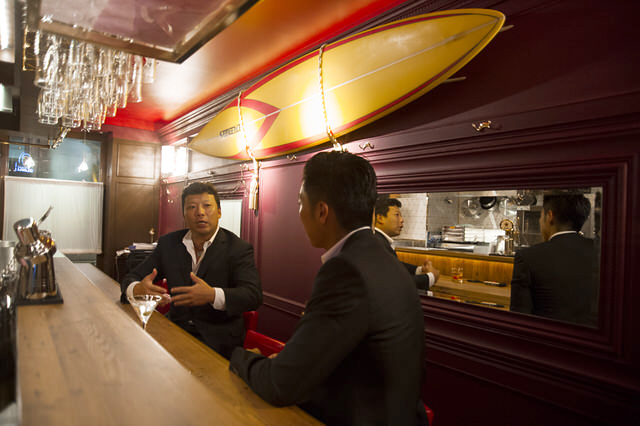
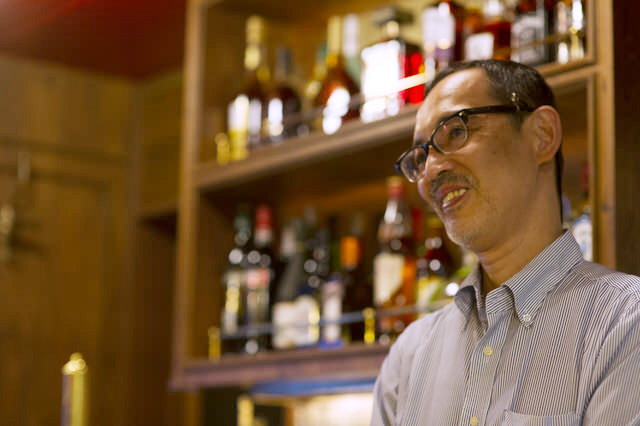
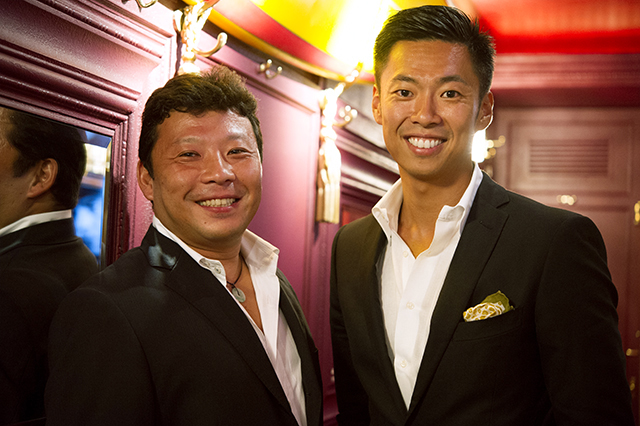
The bread from Maison Kayser, made with natural yeast, has a distinct aroma and delicious taste, and I have been enjoying it for several years. Recently, I started surfing, and one day, while heading to the beach with a senior surfer, I was surprised and excited to meet Mr. Shuichiro Kimura. We talked non-stop during the five-hour round trip, discussing business philosophy and various topics, and found ourselves in complete agreement. This led to his participation in this interview.
I have great respect for Shuichiro-san, who, despite being the eldest son of Kimuraya, ventured into entrepreneurship without any assistance and has successfully expanded his business. Moreover, he is not only a powerful businessman but also a professional bread artisan, which I find truly admirable. His spirit of challenge, always preparing for the next development while staying true to his beliefs, has inspired me through this interview.
September 2013, Maison Kayser Grill & Bar (next to the Takanawa Main Store). Editing: Naomi Kusuda. Photography: Daiki Ayusawa
Maison Kayser Takanawa Main Store “Grill & Bar”
Experience a new style of dining that embodies Maison Kayser’s concept of “a wonderful life with bread.” We invite you to visit us and enjoy the unique atmosphere.| Opening Hours: | Weekdays | 11:30 – 22:00 (Last Order) Lunch Time: 11:30 – 14:00 Bar Time: 17:00 onwards |
|---|---|---|
| Weekends and Holidays | 11:30 – 18:00 (Last Order) *Dining only. | |
| Address | 1-4-21 Takanawa, Minato-ku, Tokyo [[MAP]] | |
| Seating Capacity | 12 seats at the counter | |































































































































